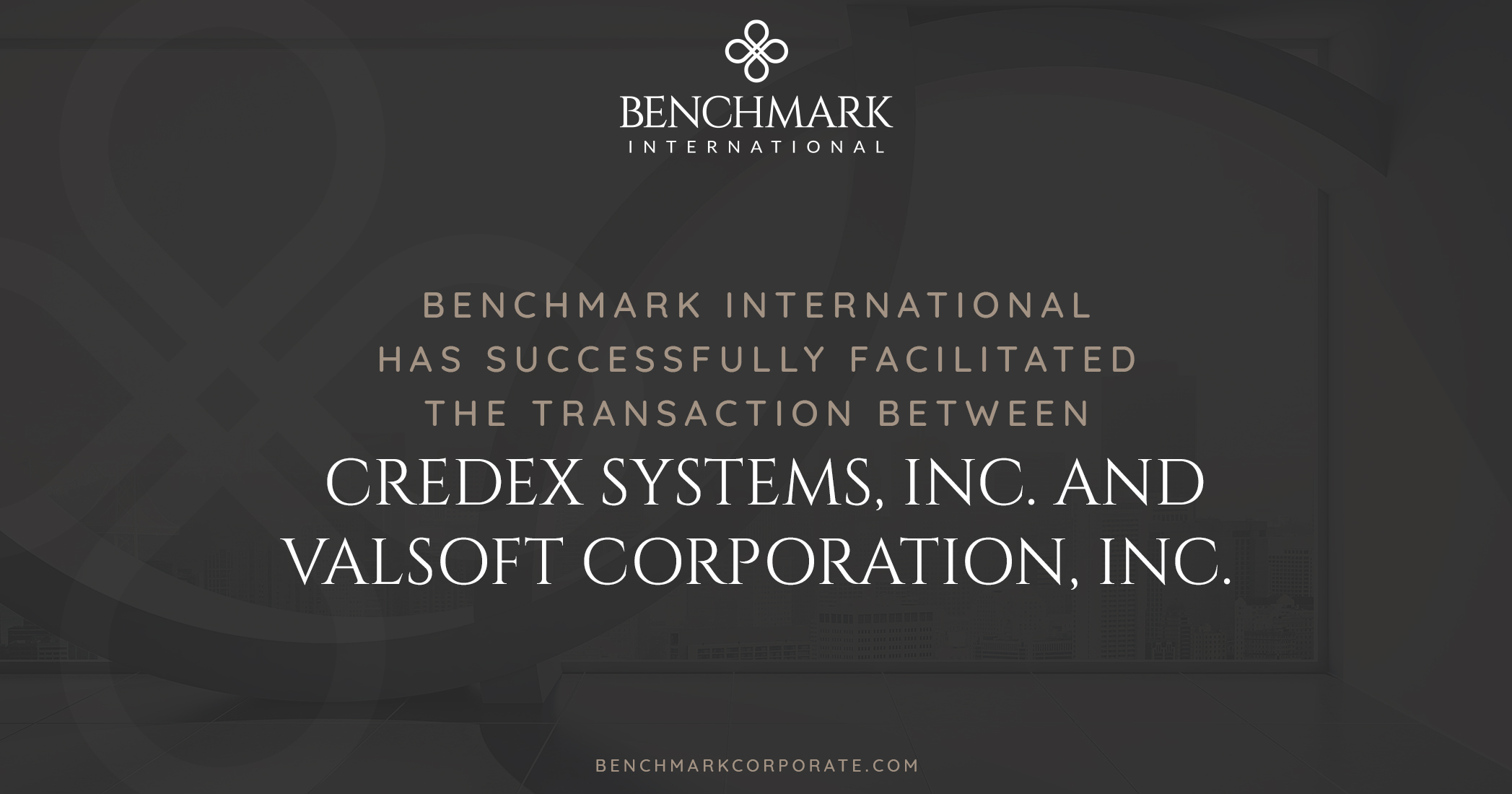Are you considering buying or selling a privately held business? Below are a few stats that you might find surprising:
READ MORE >>Archives
9 Surprising Stats About Buying or Selling a Business
Global CEO, Gregory Jackson, named a recipient of the 2019 Leadership Award from M&A Advisor
Benchmark International is pleased to announce that our very own Global CEO, Gregory Jackson, has been announced a recipient of the 2019 Leadership Award from M&A Advisor. Our organization works hard to make the best transactions for our clients, and Mr. Jackson notes that without all members of the Benchmark International team, this accomplishment would not be possible.
READ MORE >>Share this:
The Importance Of Succession Planning
As a business owner, have you given any consideration to your succession plan?
It is important to note that a succession plan is not the same as an exit plan, but rather an element within an exit plan. Succession planning is focused on the interests of the business when an owner departs and another takes over. Exit planning is focused on the interests of the business owner, with succession just being one aspect in the overall plan.
It is actually quite common for small business owners to not have a succession plan, or even an exit plan, in place. Regardless of whether you have no plans of retiring anytime soon, the future is unpredictable, and having a solid, documented strategy in place can be crucial to the health and fate of your business. You will want to be ready for any scenario or opportunity that comes along.
READ MORE >>Share this:
The Training Market and M&A
The global corporate training market is projected to grow at a compound annual rate of 9.8% and reach $114 billion by 2022, according to industry experts. Furthermore, a combination of economic, regulatory, demographic and technological forces is reshaping the labour market and forcing employers to increase the speed and efficiency with which they train employees. Meanwhile, ongoing changes in how people consume information and engage with educational content have unlocked new opportunities for innovative training companies to significantly enhance the learning experience. These factors have led to a strong interest in training firms, with much of the interest over the last few years coming from players outside the industry, who wouldn’t traditionally be linked with training.
Some of the high-profile acquisitions coming from adjacent markets include recruitment companies looking to use training as a way to strengthen the marketability of their talent pools and help employers bridge the skills gap. For example, in May 2018, Adecco Group announced it was acquiring General Assembly, which provides courses in web development, coding, and other digital skills. A few years earlier, LinkedIn enhanced its training capabilities by acquiring Lynda.com, an online education company. Penn Foster also partnered with EmployBridge, a large commercial recruitment company, to provide online courses to EmployBridge employees for free.
Furthermore, several factors over the last decade have given employer-sponsored training an increased share in the market. The most significant is that the ever-shortening technology is cycle is accelerating the rate in which certain skills become obsolete. As a result, employers are being driven to make investments in hiring, training, and re-training qualified workers. Increasing regulations and changes to the policy are contributing to the industry, increasing demand for regulatory and compliance monitoring training.
Key Industry Trends
· eLearning: The increasing use of eLearning has grown to become a multi-billion-dollar market. Factors that have contributed to growth in eLearning include the rising costs of instructor-led, classroom-based training as well as the need for continuous, life-long learning. Awareness and compliance training were two of the first to use eLearning, however sophisticated platforms have made even soft skills training a practical reality for this approach. Add to that the potential for significant cost savings, and it’s not difficult to predict the continued expansion of eLearning for years to come.
· Training being used to attract and retain employees: Training is increasingly being viewed as an employee incentive, along with perks such as healthcare and retirement benefits. Employees appreciate that access to training will help them hone their skillset – as well as developing new skills. This also helps businesses retain employees, a recent poll found that more than half of all currently employed adults are either actively searching for a new job or are at least passively entertaining other career opportunities. Using training is a way to help develop your employees while keeping them engaged and productive.
· Skill gaps continue to grow: According to a report by Payscale Research, 33% of employers had positions open for over six months due to a lack of skilled or qualified candidates. As such, companies must take it upon themselves to provide future employees with the training and development opportunities to meet the demand of the role.
· Convenience: With the ever-increasing rise of technology, more people are demanding that training is easily accessible. They expect learning to happen at any time, in any place. As the vast majority of people use smart phones, this means they don’t have to wait to access training.
· Personalisation: Off-the-shelf training programs are on a rapid decline, employees expect training to be relevant to their unique situation. This means adapting content based on factors such as work environment, the culture within the organisation, employee experience, location, and job performance. With eLearning, there is cause for optimism and excitement in the industry that customised training will become the norm. While training improves, so will company performance.
We Are Ready When You Are.
Call Benchmark International today and speak with one of our analyst about your company's exit or growth strategies.
READ MORE >>Share this:
10 Undeniable Reasons To Sell Your Company In 2019
Timing is everything, and 2019 is the prime time to sell a business for maximum value. The conditions are extremely favorable right now for several reasons, and waiting could mean that you miss out an ideal opportunity.
READ MORE >>Share this:
Benchmark International Facilitated The Transaction Of Am Engineering, Inc. To Fremont-Wright, LLC
Benchmark International has successfully facilitated the acquisition of AM Engineering, Inc. (“AME”) by Fremont-Wright, LLC (“Fremont-Wright”).
AME is a Florida-based business headquartered in Sarasota. AME specializes in civil engineering and land surveying projects for large and small-scale land development, water distribution systems, wastewater collection facilities, roadways, parking facilities, and site grading. AME offers both engineering and surveying services for residential and commercial clients. The sale to Fremont-Wright creates new growth opportunities for the business.
Fremont-Wright is a holding company based in Memphis, TN, and specializes in aerial and land survey, as well as civil and structural engineering. Its companies – Triton Engineering, I.F. Rooks, Colbert Matz Rosenfelt, and Harmsen – also offer services such as photogrammetry, environment management, volumetric services and utility design. Fremont-Wright serves the institutional, mixed use, commercial and residential industries. This acquisition fits well with Fremont-Wright’s continued nationwide growth strategy.
Shawn Leins, president and one of the owners of AME stated, “We are excited to join the Fremont- Wright team and look forward to continued growth and success.”
Regarding the deal, Transaction Director Leo VanderSchuur at Benchmark International stated, “It was a pleasure to represent AME in this strategic transaction. On behalf of Benchmark International, we wish both companies continued success.”
READ MORE >>Share this:
Global Food & Beverage Industry Outlook
This is an intriguing time to be involved in the global food and beverage industry. 2019 remains promising for M&A opportunities for several reasons. Giant food companies are on a spree to expand their portfolios with food innovation. Food start-ups and smaller private food companies are looking to cash in on growth and exit strategies. And private equity and venture capital firms are motivated to get their piece of the pie.
READ MORE >>Share this:
Benchmark International’s Shortlisted For Business Of The Year
Benchmark International’s was shortlisted for Business of the Year by the Greater Manchester Business Awards.
READ MORE >>Share this:
What Is A Strategic Partner?
A strategic partner is another business entity with which you form an agreement to share resources with the mission of growth and mutual success. There are different types of strategic partnerships.
- Horizontal Partnership: Businesses within the same field join alliances to improve their market position. Example: Facebook and Instagram.
- Vertical Partnership: Businesses team up with companies within the same supply chain (suppliers, distributors and retailers), often to stabilize supply chains and increase sales. Example: LiveNation and Ticketmaster.
- Equity Partnership: An investor acquires a percentage interest in a business, providing needed capital and sharing in profits and losses.
- Joint Venture: Two or more businesses form an entirely new legal entity in which the profits and risks are shared, and the original companies continue to exist on their own. Example: Microsoft and NBC’s creation of MSNBC.
- Merger: Two companies agree to go forward as a single new company and the original companies no longer exist. Example: Exxon and Mobil, now Exxon Mobil Corp.
- Acquisition: One company takes over another company and establishes itself as the new owner. Example: AOL and Time Warner, now Time Warner.
Why Do I Need One?
A strategic partnership can be an extremely powerful tactic that gives your business a competitive edge. According to a study by the CMO Council, 85 percent of business owners believe partnerships are essential for business success.There are several reasons why it is a commonly relied-upon growth plan.
- Expansion into new markets
- Increased brand awareness
- Product line extension
- Access to new customers
- Improved supply chain performance
- Added value for existing customers
- Acceleration of innovation
- Strengthening of weaknesses
- Sourcing of capital
A successful partnership must be built on a solid growth strategy and make sense from a capabilities perspective. The goals, values and culture of all partners should be aligned. You also need to have the right infrastructure in place. And the timing of the venture can be critical depending on the market. A partnership is a major endeavor and you absolutely want to get it right. Unfortunately, most organizations are not armed with the proper connections, resources and management capabilities to maximize the potential of a partnership. According to a report by the Business Performance Innovation Network (BPI):
- 43 percent of business partnerships have high failure rates.
- 45 percent are unable to maintain long-term, successful relationships.
- 42 percent of partnerships are not well leveraged.
- 67 percent of companies that agree to work together lack formal partnering strategies.
How to Get It Right
The smartest way to ensure that you are entering into a successful partnership is to seek the guidance of an advisor such as Benchmark International. We have the connections, experience, data-driven analytics, and knowledge to help you devise a carefully crafted growth strategy that is built on confidence and captures the most value. If you are a founder, an owner, an entrepreneur, or part of the leadership of an established company, we encourage you to reach out to us and start the conversation about how a strategic partnership can benefit your business.
READ MORE >>Share this:
Benchmark International has Successfully Facilitated The Acquisition Of Credex Systems, Inc. by Valsoft Corporation, Inc.
Benchmark International has successfully facilitated the acquisition of Credex Systems, Inc. (Credex) by Valsoft Corporation, Inc. (Valsoft). Credex is a vertical software solution that offers loan origination and servicing software. The cradle-to-grave software solution originates and administrates a loan throughout its existence, serving financial entities and their client base. Valsoft acquires and develops vertical market software companies, enabling each business to deliver the best mission-critical solutions for customers in their respective industry or niche. A key tenet of Valsoft’s philosophy is to invest in well-established businesses and foster an entrepreneurial environment that shapes a company into a leader in its respective industry. Unlike private equity and VC firms, Valsoft does not have a predefined investment horizon and looks to buy, hold, and create value through long-term partnerships with existing management and customers.
Michael Lightfoot, President and owner of Credex said “The sale of Credex to Valsoft was a quick process that took a number of turns during diligence. Throughout the engagement with Benchmark, the team acted as true advisor helping to walk me through each step of the process, and maintain the majority of my attention on running Credex on a day-to-day basis. I also appreciate the speed and transparency Valsoft operated with, allowing to move from first interest to a deal closing within 5 months.”
Chris Malouf, Associate of Mergers & Acquisitions at Valsoft, said “We are thrilled to have completed the acquisition of Credex. Pairing Michael’s expertise with our firm’s resources will allow us to seamlessly enter this market. We have plans to continue backing Michael Lightfoot as President of Credex and lead the charge for Valsoft’s expansion into loan origination and servicing.”
Benchmark International Associate Transaction Director David Steverson stated, “We’re extremely excited for Michael Lightfoot, the Credex family, and the Valsoft team. This transaction allows Valsoft to maintain their investment thesis while entering a new market, loan origination and servicing. Partnering Credex’ product offering with Valsoft’s industry knowledge and wealth of resources will allow Credex to develop into a prominent player within this market.”
Share this:
5 Books to Read Before Buying a Business
The Complete Guide to Buying a Business
By Fred Steingold J.D.
Written by a Michigan Attorney who has extensive experience representing small businesses in several capacities, this book is a comprehensive resource that provides a thorough overview of the buying process with concrete examples. If you are looking to acquire a huge corporation, this is probably not the book for you. However, if you are seeking to purchase a small business, this book serves as a great guide to subjects such as financing, negotiating, comparisons of entities, and standard forms. It will also inform you of when you likely need to enlist the help of a professional broker or lawyer.
Buy Then Build: How Acquisition Entrepreneurs Outsmart the Startup Game
By Walker Deibel
Buying and growing an existing business is considered a smarter path to success than dealing with the pitfalls of start-up companies. This book outlines the ins and outs of becoming a successful acquisition entrepreneur, written by an investor who has co-founded three startups and acquired seven companies. It delves into beneficial topics such as spending less time raising capital, using ownership to achieve financial independence, discovering the best opportunities, and finding quality business brokers.
Buying a Business That Makes You Rich
By John Martinka
The author has of this book has more than 20 years of experience as a business buyer advocate, helping executives to abandon the corporate world to enjoy the freedoms of business ownership. In this book you will read about being smart when purchasing a business, including ways to avoiding overpaying and knowing the right questions to ask throughout the process. It offers smart methodologies and practical insights without overwhelming the reader with what can be a complex undertaking.
How to Buy a Business without Being Had: Successfully Negotiating the Purchase of a Small Business
By Jack Gibson
Case studies, practical advice, and simple terminology are all part of what make this book a great read for anyone looking to purchase a business. The author offers more than 30 years of experience helping entrepreneurs learn how to talk to sellers and brokers, with a focus on avoiding missteps. The book also includes commentary from business owners who wished they had known how to avoid common mistakes, as well as a useful study and discussion guide.
HBR Guide to Buying a Small Business: Think Big, Buy Small, Own Your Own Company (HBR Guide Series)
By Richard S. Ruback and Royce Yudkoff
This book is written from the perspective of professors at Harvard Business School as a guide to entrepreneurship for small business owners. The text was previously only available to Harvard students through the authors’ courses. It is a concise yet thorough resource that will arm you with important topics you should discuss with sellers, brokers and attorneys along the way when buying a small business.
Ready to Buy?
If you feel you are ready to buy a business, while these books can be helpful, Benchmark International can help ensure you are making the right move. Our strategists will use our insider knowledge and exclusive databases to connect you with the ideal match for an acquisition or growth plan.
READ MORE >>Share this:
Benchmark International's Florida Rush Girls 04 Won the Florida Cup!
Benchmark International's sponsored team, Florida Rush Girls 04 won the Florida Cup on Saturday and are off to nationals in Colorado in July!!
READ MORE >>Share this:
Higher Education Industry outlook
Through the year 2023, the global higher education market is expected to grow at a compound annual growth rate of more than 12%. There are several factors driving positive growth in this sector, from the high demand for technological innovations to the surge of internationalization.
READ MORE >>Share this:
Benchmark International Advises on the Transaction Between Total Resources UK and Mercia Fund Managers
Benchmark International is pleased to announce that it has successfully facilitated an £8m deal between Total Resources and Mercia.
Founded five years ago after Managing Director, Les Thompson, acquired the assets of Lincolnshire-based Traffic Control and Management, South Tyneside-based Total Resources now operates across five depots throughout the UK, employing around 140 people and offering all aspects of traffic management.
A rapidly growing business, Total Resources was the winner of the fastest growing small business award at the annual Fastest 50 event at the end of 2018. Turnover has soared on a local level due to work at major concerts for Rihanna, Take That, and Bruce Springsteen, and the forthcoming Spice Girls tour, all at Sunderland’s Stadium of Light.
Mercia, provider of both equity and debt finance to small businesses based in the UK, will now allow Total Resources to expand throughout the UK.
The £8m deal for Total Resources has been a syndicated investment across three different funds bringing its venture, debt and growth investment teams together in a single transaction.
READ MORE >>Share this:
Real Estate Industry Outlook
The global real estate environment is off to a strong start for 2019. While uncertainties regarding trade, Brexit, and other geopolitical tensions linger, we have yet to see any major weaknesses in real estate markets. The sector continues to attract capital and pricing levels are holding steady thanks to strong capital flows.
Real Capital Analytics (RCA) reports that acquisitions of income-producing commercial real estate last year rose by 3 percent to $963.7 billion. That is the third highest annual total on record behind 2007 and 2015.
The Multifamily Sector
Multifamily housing is expected to continue to attract sustained investment and debt capital. Multifamily demand remains steady and is driving up rent prices as younger generations are being priced out of home ownership and older generations are downsizing. The top three emerging markets to watch in the United States for multifamily housing this year are Phoenix, Portland, and Tampa Bay.
Workforce Housing
The growing need for workforce housing is also driving the market for multifamily housing. In fact, workforce housing has actually outperformed the overall multifamily market in each of the last four years.According to a report by CBRE, workforce housing has brought in nearly $375 billion in investment over the last five years. That is more than 51 percent of the total for all multifamily asset classes.
Tech, Retail & E-commerce
Real estate fundamentals remain strong amid trends surrounding urbanization, retail, and ecommerce. Suburban markets are adapting to technology and becoming more urbanized with added focus on community-oriented retail concepts. Retail stores and shopping malls are undergoing an identity transformation, as retailers are adjusting their real estate needs to accommodate omnichannel experiences, especially in the U.S. and Europe. Additionally, e-commerce companies are adding smaller, satellite facilities to their networks of regional distribution centers as a reaction to the demand for fast, low-cost shipping.
Tech firms and flexible space providers continue to have a major impact on the global real estate market this year. Flexible space providers are targeting their focus on larger enterprises. More and more firms are leasing shared spaces. And as employees become more mobile, companies are adapting and coworking is becoming more popular. Coworking is primarily focused in high-wage markets and cities with a large number of professional services companies. Coworking spaces in tech markets are nearly double that of other markets.
Mixed-use real estate is also going to remain a significant opportunity, with the convergence of retail, office, residential, hospitality, and community-focused spaces. This adaptation is causing a shift in the types of tenants that properties are accommodating, resulting in shorter lease agreements.
REITs and Mergers & Acquisitions
Investors are expected to continue to diversify into secondary markets in search of yield. This includes real estate investment trusts (REITs), which have recently increased valuations and pay healthy dividends. Global REITs are projected to outperform other sectors and deliver strong returns in 2019. The property sectors among REITs expected to see the most M&A activity this year are industrial, self-storage, data center, multifamily, and student housing. Experts also predict the possibilities of some deals in the hotel REIT sector.
The year 2018 outperformed 2015’s prosperity for global commercial real estate investment in the current cycle, with a five percent increase in global investment volume. The U.S. accounted for 52 percent of global transactions. A total of six investors from Canada, France and China invested a record $41 billion in U.S. entities.
The value of U.S. entity-level transactions increased threefold last year, driven in majority by cross-border investment. Toronto-based Brookfield acquired Forest City Realty for $11 billion, making Brookfield the second-largest property owner in New York City, led only by the city government, and boasting a NYC portfolio worth around $32 billion. In 2018, Brookfield also acquired the second-largest U.S. mall owner, General Growth Properties, for $15 billion. Both Forest City and GGP were publicly traded REITs.
Global Hotspots
International property is sustaining its 2018 performances as a remarkably popular market. Some of the top cities for real estate investment in 2019 include Lisbon, Toronto, Dallas-Forth Worth, Melbourne, Singapore, Berlin, New York City, Vancouver, Raleigh, Montreal, Tokyo, Madrid, Osaka, and Sydney. Specifically, the city of Lisbon has been noted to be the 2019 investment capital of Europe. This is due to increased tourism, a growing economy, and competitively lower pricing.
Contact us
If you are interested pursuing a growth strategy or an exit plan. No matter what sector you work or invest in, Benchmark International can help you take your aspirations to the next level.
READ MORE >>Share this:
Benchmark International has Successfully Facilitated the Transaction Between Ships Electronic Services Limited and Wärtsilä Corporation
Benchmark International is pleased to announce the transaction between global technology group, Wärtsilä, and Ships Electronic Services (SES), specialists in navigation and communication electronics, installation, maintenance and repair services, primarily for commercial and leisure vessels.
Established in 1974, SES has its headquarters in Rochester along with nine other offices in the UK, where the company employs 47 staff. Together with its wholly-owned subsidiary Greenham Regis Ltd, SES holds a strong presence across the local marine services market.
Wärtsilä is a Finnish corporation listed on Nasdaq Helsinki that operates in smart technologies and complete lifecycle solutions for the marine and energy markets, maximising the environmental and economic performance of vessels and power plants for its customers. The company has operations in over 200 locations across more than 80 countries around the world, employing approximately 19,000 staff. In 2018, Wärtsilä’s net sales totalled €5.2 billion.
Shareholder of SES, Paul Rees, said: “We are very excited to join Wärtsilä. We have already identified several shared opportunities between the companies and look forward to bringing the enhanced service offering to our customers.”
READ MORE >>Share this:
Telecommunications Industry Outlook
The telecommunications industry will be undergoing some new transitions this year, most notably due to the rollout of fifth generation (5G) technology. Global telecom revenue is forecasted to grow up to three percent through 2019.
READ MORE >>Share this:
Here are the Reasons Why Private Equity Firms are Investing in SaaS Companies
There has been a steep incline in private equity investors buying SaaS (software as a service) companies over the last five years with PE firms investing in, recapitalising, and outright buying numerous SaaS companies. In fact, private equity accounted for 2.5% of all private equity portfolio acquisitions in 2018.
So, what are the reasons for private equity firms investing so heavily into SaaS companies?
READ MORE >>Share this:
Retail Industry Outlook
While ongoing geopolitical uncertainties could present challenges in 2019, the overall outlook for the global retail industry remains optimistic. In the world’s top retail market, the United States, retail sales are predicted to grow more than 3 percent to exceed $5.5 trillion. But for the first time ever, China is expected to outperform the U.S. in retail sales. China is forecasted to see a 7.5 percent growth in retail sales this year, reaching $5.6 trillion.
READ MORE >>Share this:
Northern Deal Values Boosted by Venture Capital Investors
Venture capital investors are driving deal values back up for companies across the North according to new data by KPMG Enterprise's quarterly report on global trends – Venture Pulse.
Despite a decrease in value and volume compared to the first quarter of 2018, the number of VC transactions completed between January and March 2019 was 17, up from 12 in the final quarter of 2018, with the average deal value increasing from £2.17m to £2.91m.
READ MORE >> Benchmark International
Benchmark International  Benchmark International
Benchmark International 






















